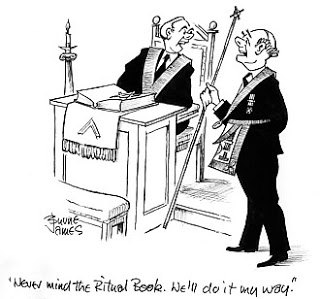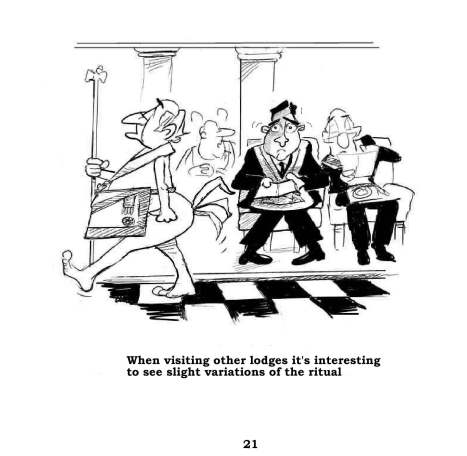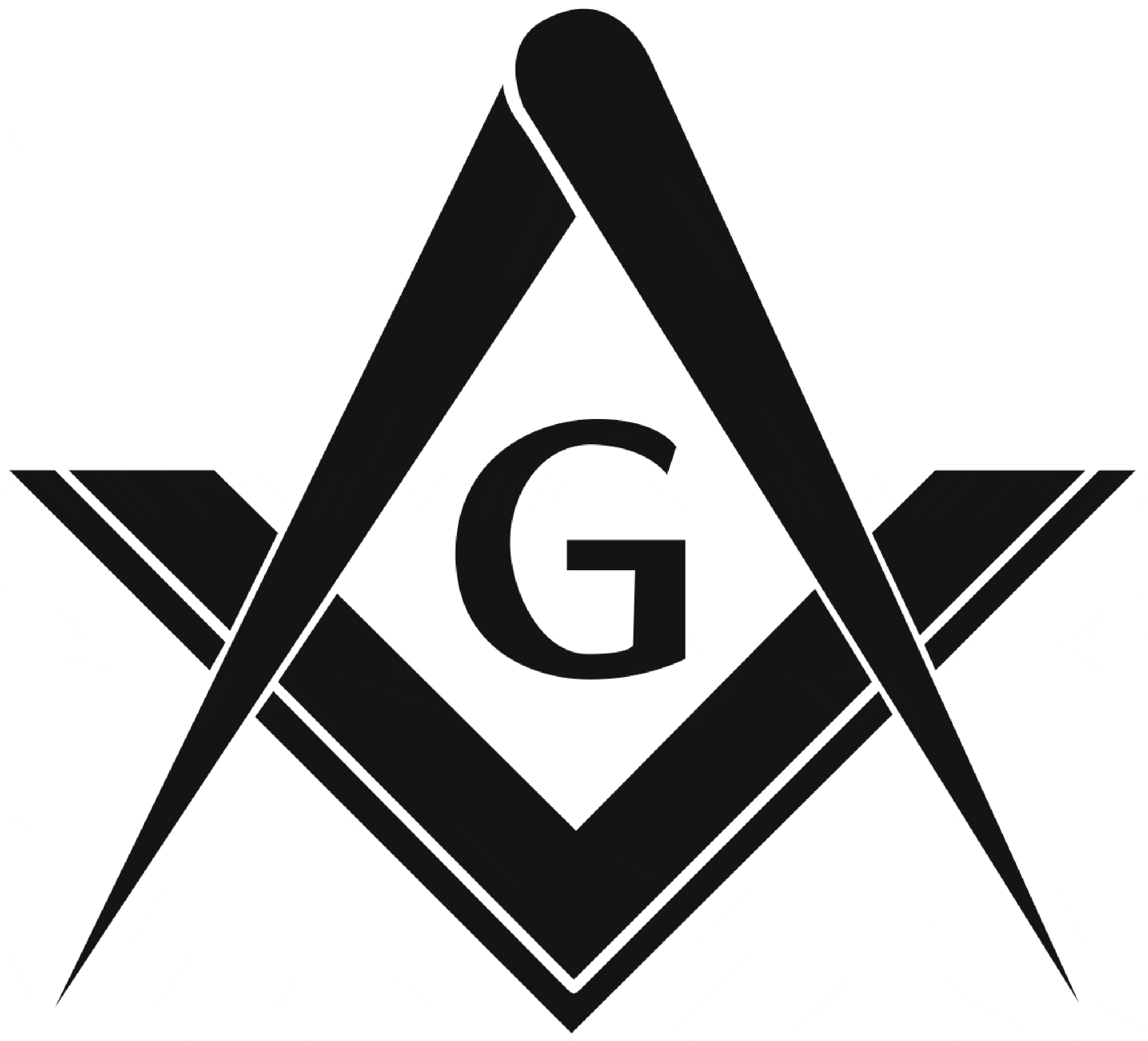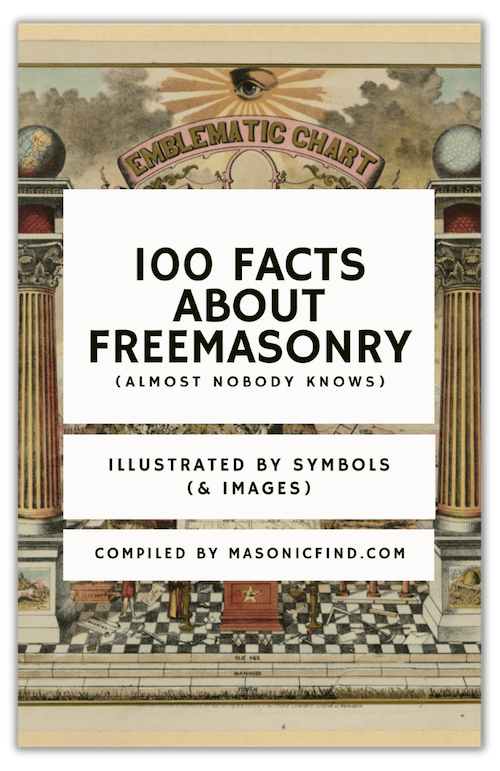To understand the need, significance, and use of Masonic protocols and etiquette in our lodges and on Grand Lodge occasions, it is necessary to understand the role that protocol and etiquette play in not only our lodge but in our everyday lives.
This guide deals with protocols and etiquette, first in general terms, then as part of our lives, and finally, in Freemasonry.

What is Protocol?
The Free Dictionary defines it as:
pro·to·col (prō′tə-kôl′, -kōl′, -kŏl′) n.
1. a. The forms of ceremony and etiquette observed by diplomats and heads of state.
b. A code of correct conduct: safety protocols; academic protocol.
2. The first copy of a treaty or other such document before its ratification.
3. A preliminary draft or record of a transaction.
4. The plan for a course of medical treatment or a scientific experiment.
5. Computers A standard procedure for regulating data transmission between computers.
The Origins of the Word Protocol
The term protocol is derived from the Greek word protokollan (first glue).
This comes from the act of gluing a sheet of paper to the front of a document to preserve it when it was sealed, which imparted additional authenticity to it.
In the beginning, the term protocol related to the various forms of interaction observed in official correspondence between states, which were often elaborate in nature.
Over time, however, it has come to cover a much wider range of international relations and a greater significance.
For Masons, there are really two meanings of the word protocol that interest us.
In the legal sense, it is defined as an international agreement that supplements or amends a treaty. In the diplomatic sense, the term refers to the set of rules, procedures, conventions and ceremonies that relate to relations between states.
In general, protocol represents the recognized and generally accepted system of international courtesy and a code of conduct and behavior governing diplomacy and affairs of the state. It enfolds a set of rules, forms, ceremonies, and procedures adhered to and adopted by diplomatic and government officials in their international relations with states.
Protocols, therefore, facilitate the smooth interaction between officials of organizations, diplomats and countries throughout the world with the ultimate aim to avoid unnecessary confrontation or disharmony.
Examples of such rules include the manner in which diplomatic ceremonies are conducted, demonstrating the correct respect to a head of state and such others. This represents one interpretation of Protocol.
The term Protocol also has a legal connotation. Thus, legally, it refers to an international agreement that amends or supplements a treaty; the term is also used to denote the first draft of a treaty or other diplomatic document.
In our lodges and on Grand Lodge occasions, this adopted characterization of codes of conduct and ceremonies has been defined and refined through many generations of Masonic tradition and history dating back to the Operative lodges. The significance of which cannot be underestimated for its contribution to the stability and success of the Craft.

What is Etiquette?
The term Etiquette is derived from the French language and is defined as the expected code of polite behavior or the existing conventions, forms, manners, rules, or ceremonies governing social behavior.
It also includes the set of norms and ethics governing the behavior of professional bodies such as the medical and legal profession. This code or set of conventions and manners are recognized as acceptable and required in societal relations.
Such rules or norms are not limited to society’s interactions but also include relations within a social or professional group. These days good Etiquette behavior is very important to many, many professional, civil, business, and community organizations.
The code of conduct or ethics requires a commitment to a high standard of personal and professional behavior in dealings within and without of the group or business.
This code of ethics will govern the practice and actions of such professionals in their interactions with each other and their relations with the public.
The underlying objective of Etiquette is to produce polite, respectful people who demonstrate behavior that is kind, polite, ethical, dignified, and respectful.
In particular, Etiquette seeks to ensure that people are treated with, and are shown, respect. An example of this is a conversation between two people.
Etiquette requires that you wait till a person finishes his/her explanation, narration or expression of a view before expressing your own thoughts or opinion on that matter. Interrupting a person while he/she is still talking, in a rude manner, is not an accepted norm of Etiquette.
The Difference Between Protocol and Etiquette?
Together, the terms Etiquette and Protocol refer to a set of rules, conventions, and norms that govern people’s behavior in general and in certain situations.
They differ in terms of their sphere and scope of influence and nature of the rules.
Protocol sets the rules of official conduct and etiquette the behavior that is within those rules.
Protocol in Our Daily Life
You use protocol in your daily life all the time. These are the strict rules which govern the relationship and interaction between us and the government or a government appointed body.
Think of the first time you applied for a Canadian passport and all the rules and procedures and expense you had to comply with.
It made no difference how polite you are and how you interact with the government officials if the procedures or protocol is not followed precisely then ultimately you are not successful.
Think of the last time you went to the airport to fly to another city or country. Thinks of all the steps you had to comply with to be cleared to finally board a plane and take your seat.
If you did not comply with all of those steps in the correct order, you may not make it aboard an aircraft.
Think of the steps or protocol involved in applying for and finally being offered a job. The protocol concerning parent participation in coaching your son or daughter in a community sport has certainly changed in recent years.
The steps, interactions and relationships with our society are governed by certain rules or protocols that must be adhered to or you will not be successful.
Etiquette in Our Daily Life
Etiquette is merely considered “good manners” which nearly all of us take for granted from our background. Of course, all our backgrounds are different and unique and so we had to learn to comply with social expectations of our behavior.
Not only ours actions towards each other but towards society in general. Our behavior in society is judged on how we use the excepted norms of anticipated words and action. We all know what the rules both written and unwritten, are and we act accordingly.
People that do not comply or meet with cultural or societal expectations of behavior may be labeled as “anti-social”, “unsociable” or “unfriendly” Standing in line waiting for a bus, for example.
We Canadians are good at standing in line for anything, unlike other cultures where charging the bus or subway is considered normal behavior.
Etiquette and behavioral expectations change throughout the world from culture to culture and it always pays to study a little bit of the culture you are visiting to avoid insulting people through your ignorance.
Nowhere is this more evident than in the global business world, where etiquette and personal relationships can dictate business success or failure.
Throughout the world, we Canadians are regarded as polite and just plain “nice”.
- Waiting for someone to finish speaking before you speak is considered a good social etiquette conversation.
- Remembering to say “please” and “thank you” are behaviors that have been drilled into us by our parents.
- Holding the door open for someone is considered a very courteous gesture, and social etiquette includes.
- Holding a door open for women, allowing her to pass through before you are considered good manners.
Masonic Protocol & Etiquette
“Masonic etiquette, like social etiquette is generally a matter of good manners and good behaviour. As such, therefore, it is not just a matter of keeping within the written and unwritten laws of the rules but it is a matter of doing what is considered “good form” or appropriate, dependent upon the context and acceptable behaviour. Conversely “bad form” or inappropriate behaviour in social or Masonic situations is a deliberate “flouting” of the continuing conventions.
Masonic Etiquette Today – A modern guide to Masonic Protocol and Practice by Graham Redman
“The word “Etiquette” is intended to be understood, not only in its general-although somewhat restricted-signification, namely,” The social observances required by good breeding,” but also in its wider and more comprehensive meaning as “Regulations as to behaviour, dress etc, to be observed by particular persons upon particular occasions, forms which are observed in particular places. (Dr. Ogilvie’s Dictionary.)”
The Etiquette of Freemasonry – A Handbook for the Brethren by an old past master. First Published in 1890

Masonic Protocol has been described as the rules which guide how a Masonic activity will be conducted within the lodge room, Grand Lodge occasions, and the festive board.
It is a formalized code of behavior that is set by Grand Lodge for the members of that jurisdiction and has been part of Freemasonry in one form or another since the time of the Operative Lodges.
These traditions and landmarks have been passed down through generation upon generation of Masons. Protocol encompasses standards for conducting Lodge business and maintaining a level of dignity and decorum, which ultimately promotes harmony and respect within the Lodge.
It is important to understand that rules of Protocol represent standards of behavior within our jurisdiction. They can vary from jurisdiction to jurisdiction, but many fundamental rules remain common throughout the Masonic world.
They include such items as an officer and member attire within the Lodge, the wearing of aprons and jewels, how officers and members are addressed during meetings, and how the Master is regarded when Masons enter and leave the Lodge.
They are particularly apparent when the Grand Master is visiting either the lodge room or the festive board banquet.
Strict adherence to protocol is necessary to regard and enhance the dignity of the office of the Grand Master, the officers of Grand Lodge, the officers of the Craft Lodge and all brethren everywhere.
It is important that all Masons should know and observe the rules of proper Masonic protocol and indeed attention to proper protocol and etiquette is a considered a defining characteristic of Freemasonry and Masonic meetings.
By following proper protocol and etiquette you are showing the proper respect to the Brethren and to the Fraternity. and, as such, should be practiced and encouraged by the Master at all times.
In the Grand Lodge of British Columbia the Director of Ceremonies with the assistance of the Grand Marshall shares responsibility for interpreting and enforcing proper Grand Lodge protocol. At the District level, the District Deputy Grand Marshal is responsible for protocol.
Within the Lodge it is the Master who is responsible to ensure his Lodge is following the proper protocol.
Although not all the rules of Masonic etiquette for the Grand Lodge may be written as official requirements, yet they do exist and have been transmitted from the past and accepted as the rules of polite manners and correct behavior, to be exercised while we are engaged in Masonic activities.
Protocol guarantees equality in the treatment of its members so that each person is treated with the same courtesy as every other and etiquette helps bind us together by good manners and good graces.
What Is the Purpose & Objective of Masonic Protocols and Etiquette?

The object of Protocol and Etiquette within Freemasonry is to set some simple “rules of the game” based on common courtesy, common custom, and, above all common sense.
When all the players know and play by the same basic rules, the game can be enjoyed and everyone wins. Protocol and etiquette enable us to feel comfortable on formal occasions because we know how to act without hesitancy, awkwardness or self-consciousness.
In short we know what is expected of us in lodge or on more formal occasions. Subsequently we as Masons will be more confident in our behavior and more relaxed in our attitudes making our meetings much more enjoyable.
In summary, Masonic protocol and etiquette really means what we say, how we act, what we wear, and the way things are done and how we carry on during a lodge meeting and a festive board and reflect upon how well we understand expected protocol.
Protocol and etiquette are not ends in themselves but merely guides to help us as Masons, not only understand how things work but also enfold our traditions and history.
“Harmony is the first law of the Lodge. Where discord enters, Freemasonry leaves. For one man to live in unity with another is the very essence of the Craft. Etiquette helps schisms and discord from arising.”
~ G. L. of New York, Protocol and Etiquette Review.
It is hard to imagine where we would be today if our predecessors had not established Masonic Protocol and etiquette.
Imagine the situation if Masons were to act upon hunches, whims or prejudices.
Imagine the state of our Craft if the poor were slighted by the rich, the barely literate by the well-educated, and the individual by the whole. Without Masonic protocol and etiquette enfolded within our history and traditions.
The Craft that we all love could devolve into chaos and be lost. The maintaining of harmony amongst the members of our Craft is of paramount importance. Any act of Masonic etiquette within our lodges encompasses some part of our past.
An action, courteous gesture or speech performed at a given time and place, in a certain manner, and according to protocol reinforces the ties we have with our past Masonic history and traditions. Anytime this is done it strengthens our ties with our traditions and landmarks.
Since the rules are for the good of the Craft as a whole, it affects each member. An organization such as ours adopts these rules because we need them to carry out our fine work in an atmosphere of harmony.
They are not empty and meaningless, arbitrarily enacted and imposed for the mere sake of performing them they have provided over many, many years the basis and means for brethren to come together in a state of peace and brotherly love.
Protocol and Etiquette within the jurisdiction of the Grand Lodge of British Columbia and Yukon can be found in such publications as the Lodge Officers Guide and the Book of Constitutions and Regulations of The Most Worshipful Grand Lodge of Ancient, Free and Accepted Masons of British Columbia and Yukon and other publications on its website.
Within the book of Constitutions of Grand lodge, the protocol is established for many of the activities within the jurisdiction from Grand Lodge itself to the local Craft lodge.
The protocol surrounding the Annual Communication – how it is to be managed and the rank and precedence of those that attend and those that can vote.
The rank and order of officers within Grand Lodge, the order in which they are placed, and the titles to which they are entitled i.e.
Most Worshipful Grand Master is first, followed by Most Worshipful Immediate Grand Master, Right Worshipful Deputy Grand Master and so on ensures the stability of the organization by providing a continuance of duty and governance.
Protocol recognizes the rank and precedence of Grand Lodge officers and how they are situated in the suite of the Grand Master upon his official visits.
The Grand Lodge sets the rules for Freemasonry in British Columbia and Yukon. The Lodge officers Guide illustrates the required etiquette and both are commended for your reading.
15 Questions to Ponder Concerning Protocol & Etiquette in the Masonic Environment

1. When is it proper to use the Sign of Fidelity?
2. Is it appropriate to applaud when a brother completes a piece of work?
3. Using a cell phone in lodge during a meeting – is that OK?
4. Is it OK to speak or whisper during a degree?
5. It is proper to call a brother by his first name. i.e. Bro. Bob, or Wor. Bro. Harry, in the lodge room?
6. Can you wear jeans, shorts or sandals to a lodge meeting?
7. Rising and asking a question without being recognized by the Worshipful Master – is that OK?
8. Leaving the lodge room without the permission of the WM? – is it OK?
9. Crossing between the WM and the altar during an active meeting?
10. Taking a photograph in the lodge room while the V.o.S.L is open?
11. Does Masonic etiquette extend to email?
12. Can the ballot box be placed on the top of the V.oS.L – why or why not?
13. Grand Honours are given _____ times to the District Deputy Grand Master?
14. Loud clothing and sportswear can be appropriate attire for a lodge meeting? Yes or no, explain.
15. As we are in Canada – we should never have a toast to ‘The President of the United States during the festive board?
Bibliography & Sources
Protocol, the Complete Handbook of Diplomatic, Official and Social Usage, by Mary Jane McCaffree, Devon Publishing 1989.
The Etiquette of Freemasonry – A Handbook for the brethren by An Old Past Master (1890) published by Skyhorse Publishing 2012
Masonic Etiquette Today – A Modern Guide to Masonic Protocol and Practice by Graham Redman, Published by Lewis Masonic 2012
Masonic Etiquette: The Foundation of Making Good Men Better by Brother Michael A. Hernandez, St. George’s Lodge #6, F. & A.M
Lodge Officers Guide, Grand Lodge of British Columbia, and Yukon
Constitutions and Regulations Grand Lodge of British Columbia and Yukon

FREE DOWNLOAD: 100 FACTS ABOUT FREEMASONRY (ALMOST NOBODY KNOWS)
Join the 10,000+ Brethren from around the world inside our weekly Masonic newsletter and get our best selling ebook for free (usual value: $20).
About The Author:
This essay was offered by Chris Foxon, a MM in the Grand Lodge of BC and Yukon.
Reading the email on protocol and etiquette. Almost exactly the same rules apply in New South Wales Australia, therefore some things are universally applied and accepted.
A very informative synopsis, thank you, keep up the good work.